Sun Out, Selected Poems 1952-1954
(Knopf, 2002)
This collection, published at the end of Koch’s life as a separate
volume, reflects exuberance and immediacy of language and the multiple
meanings of words in a style he only used during those early years.
Koch said, “I wanted to keep my subject up in the air as long
as possible.”
When
the Sun Tries to Go On
(Black Sparrow, 1969)
Written in 1953, this 2,400-line poem was partially inspired by Koch’s
reading War and Peace. He wrote it at the same time O’Hara was
writing his long poem "Second Avenue". Koch and O’Hara
were having a friendly competition to write poems that “included
everything.” (O’Hara’s "Second Avenue" mentions
“Kenneth in an abandoned storefront on Sunday cutting ever more
/ insinuating lobotomies of a yet-to-be-more-yielding world.”)
The poem was originally published by painter Al Leslie in a one-shot
magazine, The Hasty Papers, in 1960; it was published as a
book in 1969 with illustrations by Larry Rivers.
Ko, or A Season on Earth
(Grove, 1960)
During a Fulbright year in Florence during which Koch was supposedly
writing his doctoral dissertation, he delighted in writing this epic
narrative poem in ottava rima and iambic pentameter in the tradition
of Byron’s Don Juan and Ariosto’s Orlando Furioso.
The interwoven plots move among Cincinnati, Tucson, Paris, Tahiti,
Pompeii, Rome, Kalamazoo, Tibet, Indianapolis, Kansas City, and Rapallo.
The main characters include a Japanese baseball star, a neurotic financier
who hopes to control the earth’s dogs, an unhappy Cockney, an
English private eye, and an “Action Poet.”
|
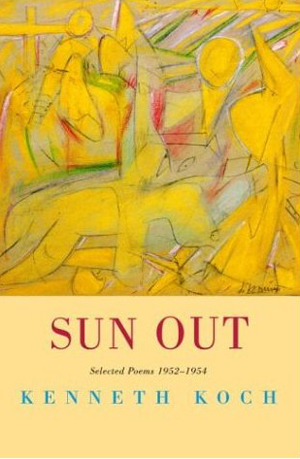 |
Thank
You and Other Poems
(Grove,
1962)
Koch’s first full-length collection is probably best known for
its comic masterpieces: “Fresh Air,” an attack on academic
poets; “The Artist,” an affectionate satire of artists’
diaries, which more or less predicted several art movements of the
sixties; “Variations on a Theme of William Carlos Williams,”
a rewrite of Williams’s “This Is Just to Say” that
takes its exposé of the insincere apology about the plums past
parody and into the sublime; and “Thank You,” a catalogue
of jobs inappropriate for the speaker. But it is the love poems that
continue to win lifelong readers to his work—“To You,”
with its mock-epic opening, “I love you as a sheriff searches
for a walnut,” “Spring,” an invitation to take a walk
on the wet streets of the city in the morning, and “In Love with
You”:
O what a physical effect it has on me
To dive forever into the light blue sea
Of your acquaintance!
The Pleasures of Peace, and Other Poems
(Grove, 1969)
During the student protests in 1968 at Columbia, Koch and other poets
were called on to write poems against the war. Koch, who had not yet
written about his experiences in World War Two, offered instead “The
Pleasures of Peace,” a picaresque celebration of good times,
love, sex, beauty, poetry, art, memory, autonomy, agoraphobia, blasphemy,
the works. “Some South American Poets” is a mini-anthology
of hasosismo, a fictitious literary movement invented by Koch—“the
art of concealing in one line what has been revealed in the previous
line.” For example, “I look at you. Oceans of beer gush
from the left side of my collarbone.” The hasos bears some resemblance
to the work of Jorge Luis Borges (who was a visiting professor at
Columbia), but is more generally in debt to the deep-image translations
of European poets that were then in vogue. “Sleeping with Women,”
one of Koch’s best-loved poems, can be found here as well.
A
Change of Hearts, Plays, Films, and Other Dramatic Works, 1951-1971
(Random House, 1973)
This collection includes all the dramatic works collected in Grove
Press’s 1966 collection Bertha, as well as newer works
for the stage. They use and parody a variety of theatrical models
and traditions—Elizabethan chronicle plays, court masques, Japanese
Noh and puppet plays, opera, and ballet. The plots center on the life
and death of a Norwegian queen, the conquest of Cornwallis by Washington,
the construction of cities, student rebellion and heart transplants,
and the gold standard. Many of these were produced off- and off-off
Broadway.
|
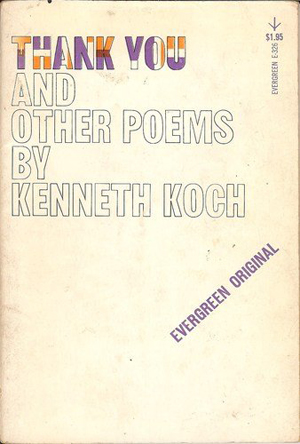
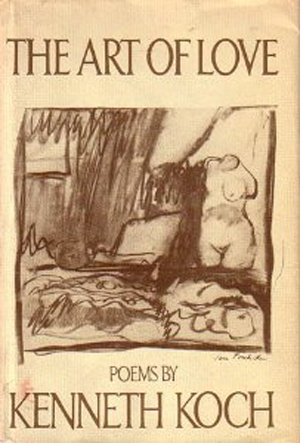
|
The
Art of Love
(Random House, 1975)
Many of these poems were written during the time when Koch started
his work in the schools teaching children to write poetry, which led
to the Poets in the Schools programs that continue today. This, his
teaching at Columbia, and his psychoanalysis during the 1960s may
have influenced this collection’s instructional and reflective
style. Some of the subjects include how to be a poet, what beauty
is, how to love a woman (from a comic, Ovid-inspired point of view),
and how to make sense of one’s life.
The
Duplications
(Random House, 1977)
While returning to some of the characters from Ko, or A
Season on Earth, this book-length poem is a witty, sensuous, oddly
profound epic that brings together the narrative skill of Ko
and the directness and intellectual clarity of The Art of Love.
The
Burning Mystery of Anna in 1951
(Random House, 1979)
This collection continues in the autobiographical mode, dealing with
many of life’s mysteries, including the meaning of a long-past
love affair, the puzzling significance of place, and the mystery of
shadows. Koch also writes of anxiety, ethics, and the seriousness
of even a single moment, as when water begins to boil.
|
 |
The
Red Robins
(Vintage, 1975; Performing Arts Journal, 1979)
The Red Robins was first published as a novel in 1975, then
Koch rewrote it as a play and saw it performed in New York City and
East Hampton in 1979. The cover copy for the paperback novel said,
“It concerns a group of young aviators called the Red Robins
who lead a strange existence going from place to place in Asia. .
. . It is a surprising and original book.” Indeed it is, with
its changing locations, shifting from prose to verse, from love story
to comic travelogue, to a battle between the forces of the equally
villainous “Santa Claus” and “Easter Bunny.”
Days and Nights
(Random House, 1982)
The interlude
fantasy of The Red Robins led back to seriousness and reflection
in Days and Nights, published shortly after the death of his
ex-wife Janice. The title poem tells of how important poetry was to
Koch’s life, “It helps me to be writing it helps me to breathe.”
The long sequence poem “In Bed” inspired collaborations
with the artist Larry Rivers and a movie with Rudy Burckhardt.
On the
Edge
(Penguin, 1986)
This book contains two long poems. A reading and lecture tour sponsored
by the United States Information Agency led to five-part poem, “Impressions
of Africa,” with its sections on Madagascar, Senegal, Gaboon, The
Congo and Zaire, and Kenya. These “impressions” of external
places are balanced by the title poem about personal memory and its
weaving together of past and present experiences that are “on the
edge” of making sense of our lives.
|
 |
Seasons
on Earth
(Penguin, 1987)
This book brings together Ko, Or a Season on Earth, The
Duplications, and a new introductory poem “Seasons on Earth”
in which Koch reflects on the writing of the first two and questions
his own mortality as he faced cancer surgery.
One
Thousand Avant-Garde Plays
(Knopf, 1988)
Although there are only 112 plays in this volume the scope and passion
of these plays suggest hundreds more. They move among imperial and
modern China, commerce in seventeenth-century Spain, the history of
costume, the avant-garde, Wittgenstein, and contemporary Haiti. In
style they also range from noble vocables of Agamemnon to the
low prose of Mahx Bruddahs. In form they are Noh plays, performance
art , classical Greek drama, skits, and masques, to name a few.
Hotel
Lambosa
(Coffee House, 1993)
This is a charming collection of short semi-autobiographical stories
in which Koch shows how well he writes when the tone is not comic.
They were inspired by the fiction of Kawabata’s Palm of Hand
stories and Hemingway’s Nick Adams stories.
One
Train
(Knopf, 1994)
Winner of the Bollingen Prize for Poetry, this collection displays a
variety of forms, such the theme and variations of “One Train May
Hide Another,” the post-Apollinaire couplets of “A Time Zone,”
the quatrains of “The First Step” (influened by Chinese poetry),
and the hundred or so brief poems that make up the long poem “On
Aesthetics.”
|
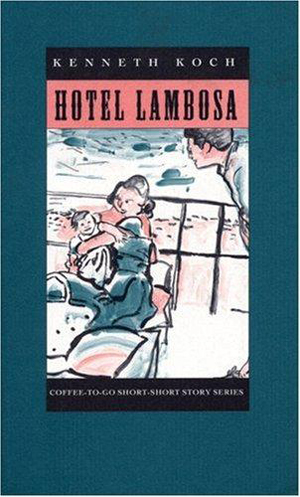 |
Making
It Up, with
Allen Ginsberg
(Catchword Papers, 1994)
This book transcribes a live collaborative improvisation between Koch
and Allen Ginsberg, moderated by Ron Padgett, at St. Mark’s Poetry
Project on May 9, 1979. Longtime friends and poetic rivals, Koch and
Ginsberg trade spontaneously composed lines of iambic pentameter,
haikus, blues, and a sestina. A unique document.
The
Gold Standard: A Book of Plays
(Knopf, 1996)
This book contains most of the plays from the previous A Change
of Hearts, but also includes two important additions. The Banquet
is based on the so-called banquet years in Paris, featuring Picasso,
Satie, Stein, Marinetti, Cocteau, Laurencin, and Apollinaire, each
speaking—and eventually singing, when it became an opera performed
in Germany and Italy. Edward and Christine is a re-write of
Koch’s short stories from Hotel Lambosa.
Straits
(Knopf, 1998)
Here Koch varies his forms in rapid sketches, as in “Vous Êtes
Plus Beaux que Vous Pensiez” about ten artists and writers; a
variant of the style of the eighteenth-century poet James Thompson’s
praise of the seasons; a group of twenty-five poems called “Songs
from the Plays,” which are songs written for plays that mostly
do not exist but from which plays might be imagined. “My Olivetti
Speaks” is perhaps Koch’s clearest and wittiest meditation
on the nature of poetry itself.
|
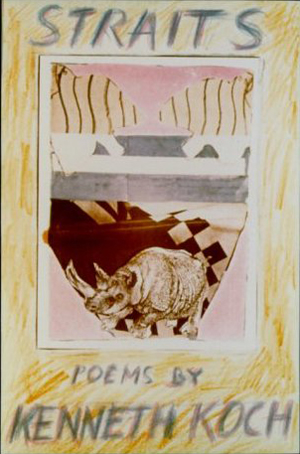 |
New
Addresses
(Knopf, 2000)
A finalist for the National Book Award, this volume of apostrophes
(or direct addresses) creates an exhilarating autobiography as Koch
talks to things important in his life—to breath, to World War
Two, to orgasms, to the French language, to Jewishness, to psychoanalysis,
to sleep, and to old age, to name a few.
A
Possible World
(Knopf, 2002)
This collection of poems came out a few months after Koch’s death.
As in all of his work, one hears the music of unconquerable exuberance
in stormy conflict with whatever resists it. While these poems still
display his witty charm, they are also profound.
Koch
oversaw two selections from his work:
Selected Poems (Random House, 1982)
On the Great Atlantic Rainway: Selected Poems (Random House,
1994)
His
works have been collected in these posthumous editions:
The Art of the Possible: Comics Mainly Without Pictures (Soft
Skull, 2004)
The Collected Poems of Kenneth Koch (Knopf , 2005)
The Collected Fiction of Kenneth Koch (Coffee House Press,
2005)
Selected Poems, ed. Ron Padgett (Library of America, 2005)
On the Edge: Collected Long Poems (Knopf, 2009)
The Banquet: The Complete Plays, Films, and Librettos (Coffee House
Press, 2013)
|
 |
The
Collected Poems
(Knopf.
750 pages)
Includes
all of Koch’s books of shorter poems, about which John Ashbery
says, “The products of a lifetime of continual inventing are
beautifully on display in this awe-inspiring banquet of a book.”
.
On
the Edge: Collected Long Poems
(Knopf. 411 pages)
Reprints
Koch’s two comic epic poems in ottava rima, Ko, or a Season
on Earth and The Duplications, as well as his Impressions
of Africa, On the Edge, and Seasons on Earth. This
volume and his Collected Poems constitute his complete poems.
The
Banquet
(Coffee House Press. 634 pages)
Gathers
Koch’s complete plays, films, and librettos, spanning more than
five decades of experimental work. Foreword by Mac Welman, introduction
by Amber Reed.
|
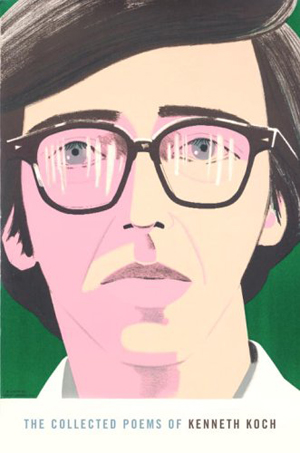 |
|
|
|
 |
| Return
to Top |
|















